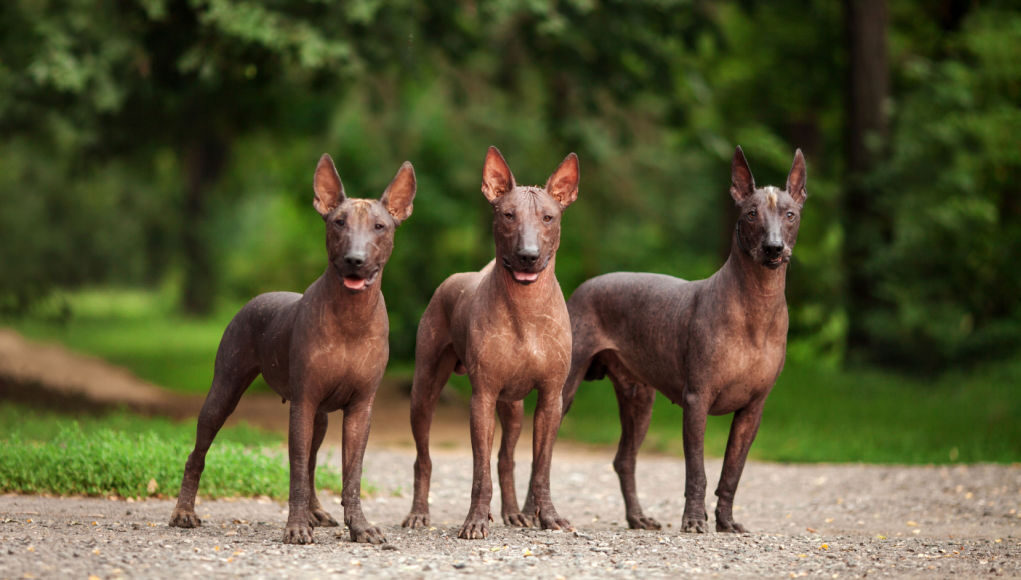Table of Contents
See a hairless dog, and you'll realize bald is beautiful! We all love the cute doggo fur, but hairless dog breeds stand out from the rest.
Hairless dogs can be an excellent choice for you. If you're not into vacuuming countless dog hair from every piece of furniture!
These exotic and elegant breeds will make perfect companions.
But they need maintenance too! So, this post is dedicated entirely to hairless dog breeds.
We'll tell you everything about hairless dogs, their species, their physical attributes, how to care for them, and more! Stay tuned till the end to find out!
Hairless Dogs: What Causes Hairlessness in Dogs?
Simply put, hairlessness is a genetic disposition. The dog breeds with a specific gene mutation causing hair loss are hairless.
There are two primary types of hairlessness traits in dogs:
- Dominant gene
- Recessive gene
Every specie passes on its genes to the next generation. These genes have two versions.
For every individual, the effect of one gene out of two expresses more strongly. It becomes a dominant gene.
The effect of the other version gets masked (although it's present in DNA). So, it is a recessive gene. So, coming back to hair loss in dogs!
Hairlessness in dogs also has two gene versions. The dogs who receive the dominant gene can transfer their trait to the next generation.
And they have a high chance of expression. So, hairless breeds can naturally develop without human intervention.
But some experts suggest that the breeders chose the hairless trait by favoring this look. So, they voluntarily bred the dogs with these physical characteristics.
Coated vs. Hairless
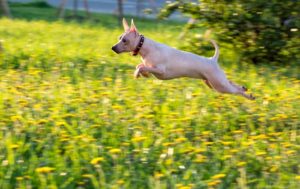
There is another distinction too! The hairless dogs can be entirely hairless or coated.
The coated variety has some hair on its body. But the hair is not uniform. You can find it in patches or as eyebrows and whiskers.
The other variety does not possess any hair at all. It has smooth, shiny skin and no eyebrows.
No matter the origin, hairless dog breeds are liked by dog enthusiasts around the world.
If you are one of them, we have listed the top 5 species below!
Top 5 Hairless Dog Breeds
Dogs come in all shapes and sizes (and colors, too!). But there are only ten known breeds of wonderful hairless dogs. Interesting, right?
Today, we have selected the top 5 hairless breeds to discuss in detail. We are talking height, personality, origin, temperament, and much more! So, let's dive in!
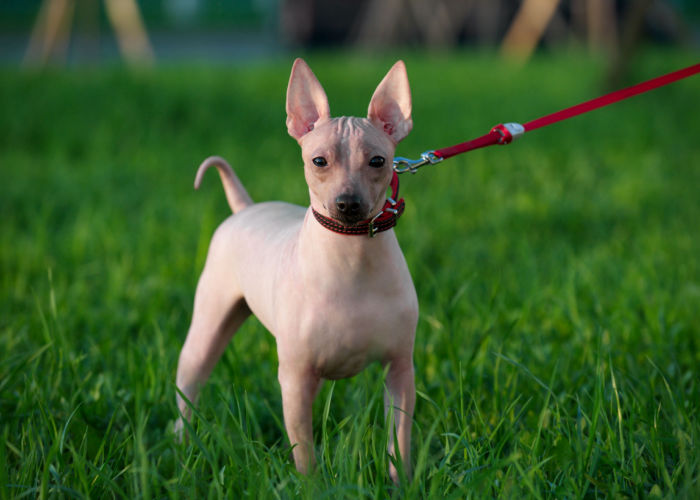
1. American Hairless Terrier
Originating in Louisiana in the 1970s, the American Hairless Terrier is a descendant of Rat Terriers.
Breeders explicitly developed this dog breed by selective breeding for hairless coats of Rat Terriers.
These small playful dogs are born with a light coat, but still, most of them have hairless traits.
Experts describe them with “true terrier grit and courage” as they are highly protective of their parents.
This American breed also makes an excellent watchdog. They are intelligent and active. Also, these dogs are on their best behavior with known people and family.
Physical Attributes
- Weight: 12-16 pounds
- Height: 12-16 inches
- Body Type: Small, muscular
- Coat Type: Short coat or completely hairless
Temperament
Since American Hairless descended from Rat Terriers, their temperament is quite similar.
Generally, this breed is highly energetic, intelligent, and playful. They have protective nature and take care of their family.
On the other hand, American Terriers can get stubborn. It is difficult to train this breed for obedience.
Expect to spend hours with consistency and patience. But, once they are motivated, they pick up things quickly.
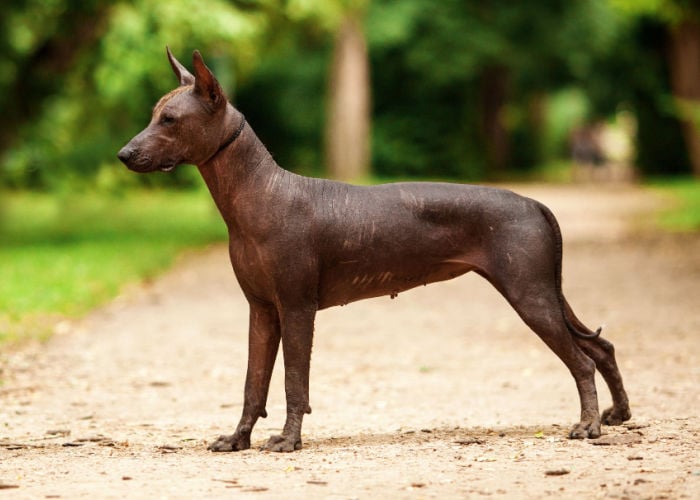
2. Xoloitzcuintli
The Xoloitzcuintli (sometimes called the Mexican Hairless dog) has a mouthful of a name and a storied past.
This ancient breed is dated back to pre-Columbian times, around 3500 years ago.
The name Xoloitzcuintli (pronounced as show-low-itz-queent-ly) comes from the ancient Aztec language, a combination of two words.
“Xolotl” in Aztec means the god of death and lightning, and “itzcuintli” is called a dog.
Xolo breed is a non-sporting dog that comes in hairless and coated versions. They have sleek short coats.
But the iconic bald version of this breed is more popular. They are loyal and make excellent watchdogs.
Interestingly, the Mexican hairless breed comes in three different sizes, as mentioned below.
These are toy, miniature, and standard sizes. This dog breed can fit into any household and adapt accordingly.
Physical Attributes
Weight:
- Toy 10-15 pounds
- Miniature 15-30 pounds
- Standard 30- 55 pounds
Height:
- Toy 10-14 inches
- Miniature 14-18 inches
- Standard 18-23 inches
Body Type: muscular, rectangular body shape with wrinkles on the forehead
Coat Type: short, sleek, flat coat or completely hairless
Temperament
The Xolo dogs have a primitive instinct. And their temperament has remained the same since then.
These dogs are bred explicitly for “protection” and other tasks. So, their genes have very few modification patterns.
Typically, these dogs are energetic and lively. Also, they are brilliant, and they pick up things fast. At times, you can find them sensitive.
Xolo dogs can become social and good with the family with proper training.
Since they are hunting dogs, they will need extra socialization to be good around small pets and children. It is better to start their training at an early age.
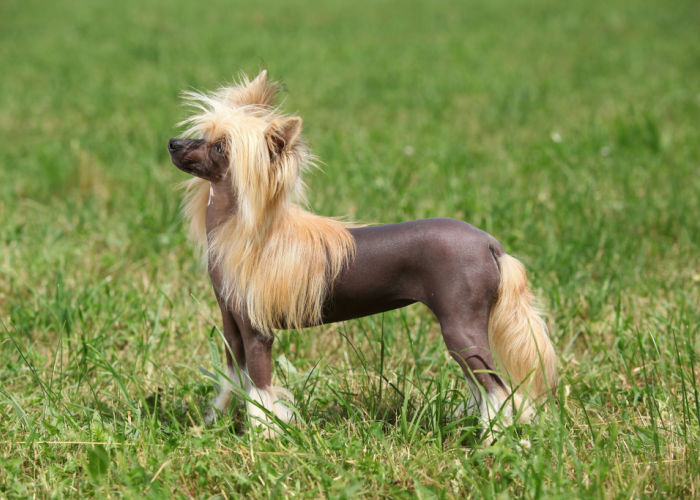
3. Chinese Crested
Well, Chinese Crested dogs do have hair! In fact, they have way more hair on their heads than other breeds.
But why do we still include it in a hairless breed?
Because though their head has hair, their bodies are entirely hairless. Yup, not a single strand of hair! And again, you can find hair on their feet.
Due to no hair present, the skin of this breed is susceptible to skin problems. Like humans, they are prone to rashes, allergies, acne, blackheads, sunburn, and other skin issues.
Apart from hairless, the Chinese Crested has another variety in the breed. Their fur is “powder puff” (pinkish white) with a soft, long, double coat on their entire body.
This variety is due to a recessive gene. So, you can spot both dominant and recessive versions in the same litter.
Both versions of this breed do not have much difference in their temperament or body type except for fur. So, expect the same behavior while deciding between the two.
Physical Attributes
- Weight: 8-12 pounds
- Height: 11-13 inches
- Body Type: slender, petite, spotted, pinkish spots with feathery white hair
- Coat Type: hairless body with a full coat on the head, feet, or tail
Temperament
The breeders developed the Chinese Crested breed as a lap dog. So, that's what they are best at!
These dogs will accompany you, love you, play with you, and care for you.
They have a playful side, but they are also quite attentive. They have a high IQ and are good at reading emotions and understanding the owner’s moods.
On the downside, these dogs are prone to experiencing separation anxiety. Since they like to cuddle and keep company, leaving them for extended periods makes them fearful.
So, this breed is not for you if you have to be away from home for too long.
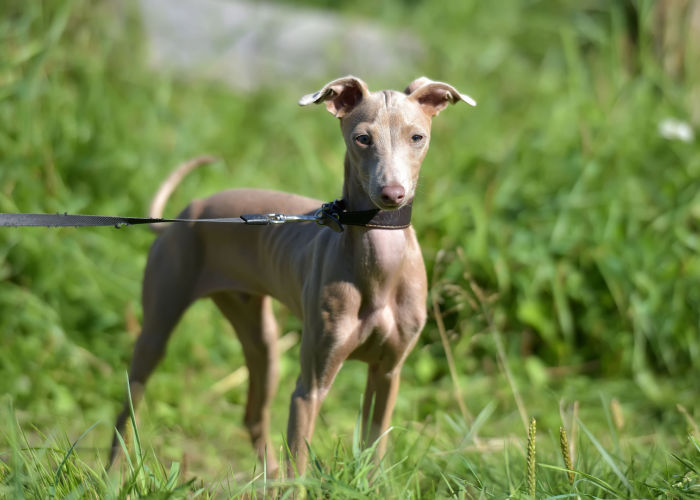
4. Peruvian Inca Orchid
As you might have guessed from the name, the Peruvian Inca breed is from Peru.
This breed also comes in different coat and size variations, like the Xolo breed. Though we include it in hairless dogs, some versions of this breed have hair.
Famous for their Mo-hawk hairstyle, the Peruvian Incas are great sighthounds. They are hunting dogs and can chase prey for owners.
They sport a solid color skin with spots depending on their variety.
Also, these dogs have sensitive skin. It would be best to take proper care and maintenance to protect them from skin diseases.
Physical Attributes
Weight:
- Small 8.5 to 17.5 pounds
- Medium 17.5 to 26.5 pounds
- Large 26.5 to 55 pounds
Height:
- Small 9.75 to 15.75 inches
- Medium 15.75 to 19.75 inches
- Large 19.75 to 25.75 inches
Body Type: Lean, long, low tail
Coat Type: Hairless with smooth skin or furry tail
Temperament
Peruvians will make good family dogs. They serve as excellent companions and watchdogs.
Although they can take time to become friends with strangers, they are generally loving and affectionate.
As this breed is a sighthound, they are energetic, intelligent, and lively. Plus, they are highly athletic.
You will have to spend at least 30 minutes in play sessions to drain their energy. We recommend regular exercise sessions to keep them on good behavior.
These dogs are obedient. They follow commands and carry out tasks.
But they will need socialization to be around other pets (not around cats since they are hunting dogs!)
5. Ecuadorian Hairless Dog
Number 5 on our list is the Ecuadorian Hairless dog from Santa Elena in Ecuador.
It is a descendant of the Peruvian dog, so some characteristics are similar in both breeds. Today, this breed is one of the most unique and rare hairless breeds.
Ecuadors have no hair. But you can find some fur on the top of the head. They can grow up to 18 inches and look magnificent.
The unique feature of Ecuador is its lack of premolars (other dogs have 16 of them!).
Ecuadorian is a rare breed, and researchers are still figuring out their features. But that is what makes them desirable for dog lovers!
Physical Attributes
- Weight: 17- 25 pounds
- Height: 15 – 18 inches
- Body Type: long linear body shape, no premolar teeth
- Coat Type: hairless with some fur on top of the head
Temperament
Not much is known about the exact temperament of Ecuadorian Hairless Dogs, as they are pretty rare.
But breeders agree that they are elegant, energetic, and lively. They carry themselves with poise and grace.
They are also hunting dogs, so expect a prey drive. They can only be around small kids and pets once you socialize them early on.
Ecuador also requires a decent amount of exercise daily to spend its energy. But they will lounge around with family too!
Need to see these hairless breeds? Check this YouTube video:
How to Care For Hairless Dogs
Taking care of a hairless dog is different from its hairy counterparts!
They don't have a protective coat of thick fur, so there are some things to look out for!
Protecting Sensitive Skin
Hairless dogs have sensitive skin. They are prone to developing rashes, allergies, sunburn, acne, and blackheads.
You need to invest in a good sunscreen and moisturizer for daily use.
Bathe them regularly to remove any dirt or toxins caught in the environment.
Ensure you use a mild shampoo with natural ingredients to prevent skin harm. Due to the lack of insulation, you must protect them from harsh weather conditions.
Extreme hot or cold temperatures can affect their skin. In warmer weather, try a cooling vest to keep their skin cool.
RELATED: 9 Common Dog Skin Problems!
Are Hairless Dogs Hypoallergenic?
It is a misconception that a dog's hair causes an allergy; thus, hairless dogs are hypoallergenic.
People are primarily allergic to dander and saliva of dogs instead of hair. So, If you're allergic, getting a hairless dog might not solve your problem.
Having said that, some dogs are hypoallergenic! Check out our list of the eight best hypoallergenic dog breeds!
Hairless Dogs: Final Words
Hairless dog breeds might not be famous for homeowners, but they are unique and exotic.
Some hairless breeds have gone extinct, but if you're looking to get one, the list of top 5 hairless breeds will interest you!
Remember that hairless dogs need the same amount of care as furry dogs (if not more) but in a different manner.
They don't have a shaggy coat, so you must protect their skin from harsh weather and allergies. Most love hunting prey, so you must ensure their early socialization.
Hairless dog breeds are striking. Tell us your opinion about hairless dogs in the comments section below.


